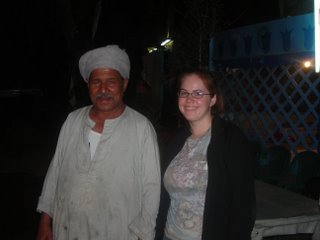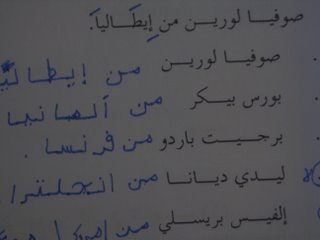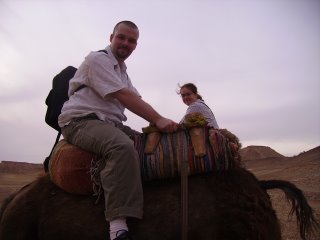 To get to the university I take the Zamalek shuttle, which departs each half hour from the dormitory, a good five-minute walk from our building. Some days the shuttle gets to the university in little more than ten minutes, but many times there is some significant delay. A taxi, for instance, has stopped his car on a main thoroughfare. He’s talking to a man on the side of the road—perhaps about a fare. Or perhaps the main is his cousin, or his sister’s husband. Their animated discussion could be about most anything. It’s also likely that we will meet some traffic problems at the “stoplights” at the European-styled roundabouts, which usually do little more than flash yellow, yellow, yellow, while a team of police officers give the signals—which amount to little more than curt gestures I still do not understand. Sometimes the traffic police are chatting with one another and forget the deft timing it requires to keep traffic flowing, but motorists are happy to honk and remind them.
To get to the university I take the Zamalek shuttle, which departs each half hour from the dormitory, a good five-minute walk from our building. Some days the shuttle gets to the university in little more than ten minutes, but many times there is some significant delay. A taxi, for instance, has stopped his car on a main thoroughfare. He’s talking to a man on the side of the road—perhaps about a fare. Or perhaps the main is his cousin, or his sister’s husband. Their animated discussion could be about most anything. It’s also likely that we will meet some traffic problems at the “stoplights” at the European-styled roundabouts, which usually do little more than flash yellow, yellow, yellow, while a team of police officers give the signals—which amount to little more than curt gestures I still do not understand. Sometimes the traffic police are chatting with one another and forget the deft timing it requires to keep traffic flowing, but motorists are happy to honk and remind them.And then there is the sheer audacity of the number of cars. It amazes me that this city moves at all, since routinely there are disorganized masses of vehicles trying to fit into increasingly tight bottlenecks, honking their horns (though not necessarily in anger…there is a complex code to honking, such that a honk can come to mean anything from “Fuck you” to “I will see you tonight and yes, yes, I will bring the Balady bread and you shall bring the tea. And peace be to you! To everybody! I love this life!”). I’ve learned since being here that lanes are a luxury—every inch of road space is needed here.
This is what happens when a head of state passes through town.
To give you an image of Tahrir Square, you can call it a poor man’s (I do despise the aptness of that cliché) Times Square. It’s the unofficial center of Cairo, with the famed Egyptian Antiquities Museum, the Arab League offices, the AUC, an always-busy mosque, and a Hardee’s, along with a lot of super-sized advertisements displayed on the roofs of the apartment buildings overlooking the square. There is a large, tiled area populated with park benches, across the street from the university, and a few lame green patches, also decorated with park benches. There is apparently a subterranean parking garage that has been full, with a lineup of vehicles waiting, every time I have passed by it. There are also always some conspicuous tank-looking vehicles that house military police, who are present in and around Tahrir Square because this is the site of many demonstrations, and when demonstrations occur around here, the military gets involved, with the government’s blessing. Such is the nerve center of Cairo.
Now, imagine that all of it has been eliminated. Well, almost all of it. No cars, no pedestrians, no traffic, no honking or Arabic cursing, and, strangely, almost no noise. The square was populated with people, to be sure, but they all spoke in hushed tones, seated at the benches or huddled close to one another. Along all the many streets that converge at Tahrir Square, lined up equidistant from one another, were black-uniformed military officers. Interestingly, they were facing away from the street, facing away from the road that “The Hons,” a.k.a. President Hosni Mubarak, would momentarily be passing through.
I hopped off the Zamalek shuttle and tried to cut across the square and make it to an 11:30 meeting with a student, but I was blocked by an officer, and told by a plainclothesman—there are many here in Egypt (I saw one just today, strutting down the street, a revolver tucked into the back of his pants)--to back off, Jack. So I waited with the whispering Egyptians. They all seemed a little bit nervous. I drank in the beautiful, not-so-polluted-as-usual day, listened to the wind flapping the flags of Egypt that had been placed, I now noticed, at several intervals throughout the square.
For all of this, the president’s passing through was uneventful--which is, I imagine, the purpose of all this hullabaloo. Still, I was struck by the intimodating display of military presence as a sign of respect to the president—or an expression of his power (after all, everybody seemed nervous). A few motorcycles came through, then a convoy of SUVs, then a few more cars, and it was over. Traffic resumed. Almost immediately, the honking started.
* * *
The other night, as M and I were settling in to watch Lord of War on this very same computer I’m now typing into, our viewing was interrupted by some severe honking down below, on the street. Honking is not unusual in Cairo, but we have become accustomed to its particular rhythms and cadences—it’s a confusing code we don’t actually understand, but we understand the noises of that code. What we were hearing was your basic frustrated honking. Naturally, we paused Nicolas Cage in the middle of another dryly delivered line, and opened our windows, and looked down.
Our street is narrow, and at night cars are typically double-parked, so it’s difficult for cars traveling in opposite directions to pass one another. I believe I have written before of the artistry of it. On this night, no artistry to be found. We had two cars facing one another, not enough space on either side for them to steer around one another. Neither car was moving. The car to the left was traveling in the direction least often traveled on our road—though, to some extent, all roads here are equal opportunity roads. But there were no cars behind this car. He was alone. He seemed to be causing trouble for all the cars going in the other direction, not only those cars who wanted to continue on down Bahgat Aly St., but who wanted to make turns at the convoluted and dangerous intersection at the end of our block. None of this was possible. Unfortunately, the ancient police officer whose charge it is to direct traffic at this intersection, or to nap, was long gone. And the guard at the Chinese Embassy, who we watched observing this action, was not interested in involving himself.
Instead, others got involved. A trapped cab driver got out of his car and walked up to the car at the left, who was apparently the one causing all this trouble. But the driver of that car was not to be moved—unless it be forward, we assumed. It was the only answer that made any sense at all. In any event, the taxi driver gave up trying to reason with the driver of the car and went back to his cab, and we didn’t see him again.
Others felt the need to involve themselves. The protégé of our bowaab, a young man who is a bowaab-in-training (we think), tried to reason with him, even trying to move parked cars (they’re usually in neutral, so people can move them as necessary) to accommodate what must have been the driver’s demand for a primo parking spot. But the space in front of our building was not primo enough, it seemed. Some other unhappy drivers left their cars, and in a manner that became increasingly animated, pleaded with the man to move. After all, I could imagine them saying, you are now making life miserable for the occupants of some twenty vehicles. Why not back up and let us through?
Not to be. In fact, the passenger of the car took the liberty of lighting a cigarette and, I imagine, smarting off to one of the increasingly upset people standing all around the car—so, naturally, the man who had been the recipient of the smart comment smacked the cigarette out of the hand of the passenger. The man in the vehicle must have responded with angry, and not smart, words, for the man in the street leaned into the car and began punching the passenger. So the driver finally emerges, ready for action...and promptly finds himself on the ground getting kicked and punched by a couple of other men. I must say that I found this little bit of violence somewhat satisfactory, since, although M and I had been laughing at the complete inanity of the situation, I was also annoyed that somebody would be so hard-headed as to insist on not moving, thus inconveniencing a great many motorists, and delaying my viewing of Lord of War.
I can say that I found the fisticuffs satisfactory because it all turned out to be harmless. As soon as the fighting started, the main perpetrator of the violence ran away—after getting in one more good punch on the passenger—and a bunch of other men—drivers, passers-by, our bowaab-in-training, did all that they could to diminish the violence, calling for peace. Initially, this didn’t work, as the driver returned to his car only long enough to move it diagonally across the road, which served as a symbolic fuck-you to…I don’t know for whom. But whomever it was intended for, there you go. But the man who had kicked him and punched his friend was gone, and the driver was now a fool, and he had no option but to do what he had been urged to do all along. He returned to his car, backed up, and disappeared down the street. Two minutes later, traffic was back to normal. It was like nothing had happened in the first place.
* * *
So sorry to those of you who have checked When in Cairo faithfully these past two weeks, only to find no update. M has offered to write an entry, but it’s been my turn to write, and I haven’t, so all that big heap of blame can go right here. Since the Eid, it has been busier at school, and I have been fighting off another sinus infection (vanquished now, it seems). Anyway, we will do all we can to post a few more times before making our way West for the long holiday to come.
James


